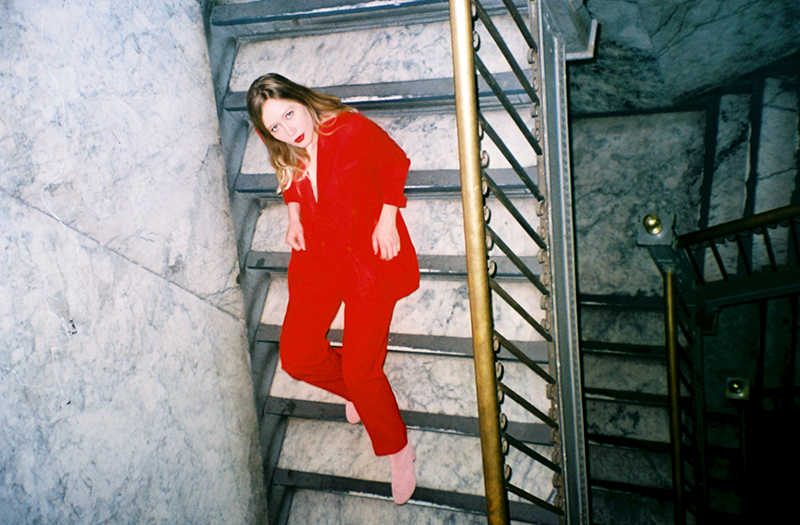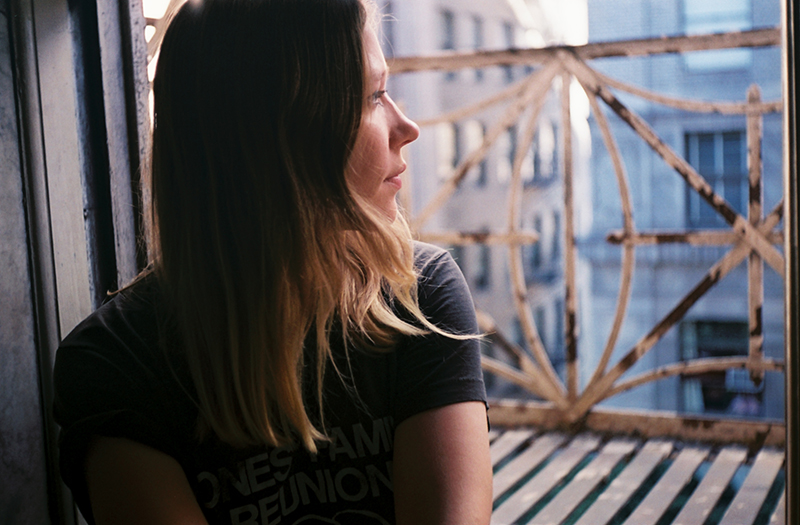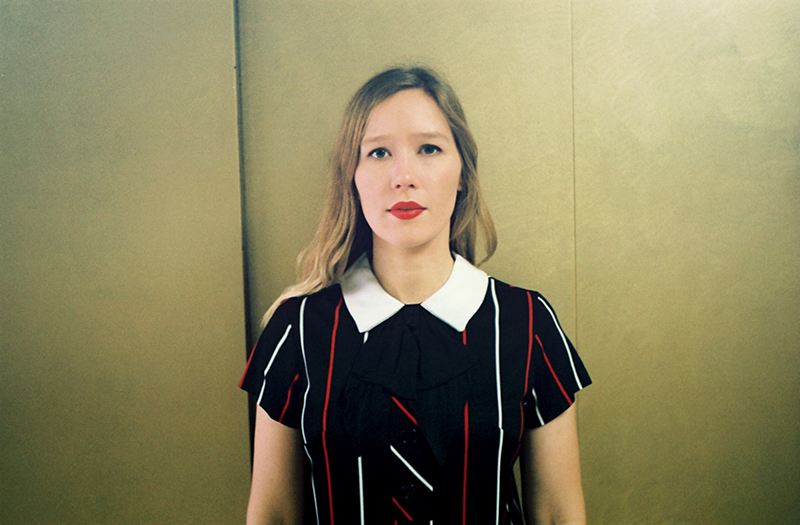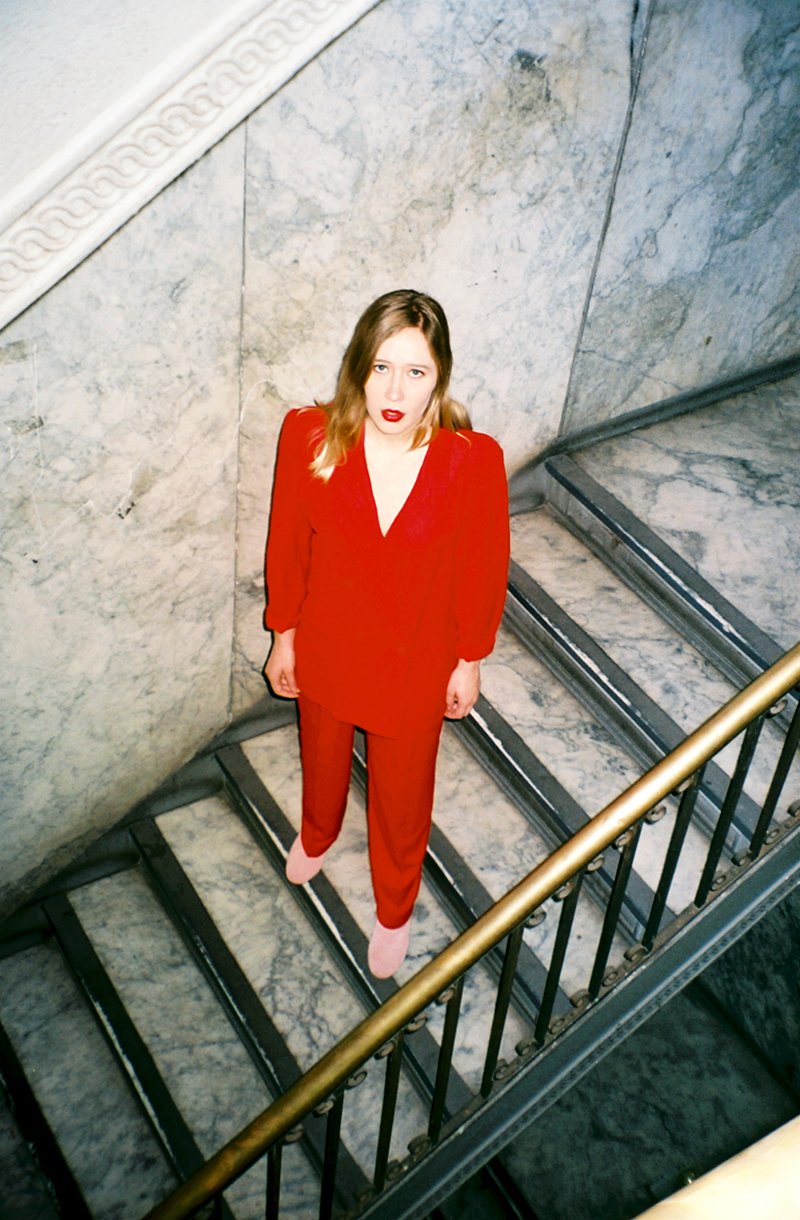

Julia Jacklin’s debut album Don’t Let The Kids Win is a coming of age tale, and its creator, the antihero. Jacklin sounds like she’s afraid to tell you the whole story, but is compelled to do so anyway. She holds little back about the fears of facing an uncharted future and the self-doubt that comes along with it. She’s not here to get information or be anyone’s poster girl. Instead, Jacklin writes about the nuances of change, growth, and uncertainty with refreshing vulnerability. In an industry that continually churns out paint-by-numbers music, Jacklin’s unwavering voice paints its own picture.
How did you first get into music and how did you decide you wanted to be a musician?
I started doing music through musicals in primary school. Then I started doing classical singing for eight years when I was a kid. A friend of mine asked me to join a band to sing harmonies when I was 19 and I was like, “Sure, I don’t know how to play anything.” I forced myself to learn guitar so I didn’t feel so awkward with my hands on stage. I started being in a folk trio girl group and we used to play in local bars.
What’s the music scene like in Sydney?
It gets a lot of shit in Australia because we have a lot of lockout laws and a lot of venues have closed recently. But it feels like it’s building up again now, more on like a grassroots level. A lot of musicians are now like ok, let’s try to put on house parties and shows. So I feel like there’s a revival, but it’s going to take awhile. It’s a bit of a frustrating place to live in as a musician. A lot of my friends want to stick it out and contribute to changes.
I read that you were shy/embarrassed to be a musician at first. Why do you think that was?
I think it takes a while for anyone to be able to say “I am a musician” as the defining feature of what they do with their lives. A lot of society views what you do to make money as what you do, and a lot of musicians don’t make their full income through music. It’s this embarrassment if you say “Oh, I’m a musician” but you work at a cafe. None of my family are musicians so even just saying I was a musician… everyone was a bit perplexed by that. It was like, “Oh yeah, but you’re going to get a degree and you’re going to have a regular job and then you’ll just play on weekends at wine bars, that doesn’t mean you’re a musician.” There’s a thing in New Zealand and Australia with the tall poppy syndrome. You always have to diminish your talents, which gets really boring.
What were you doing before you were a full-time musician?
I was at university for four years studying social policy while working at a cafe and at an essential oil factory.
How did you find the motivation to work on music at the same time?
If I didn’t have some sort of outlet or have a higher calling, I don’t know what my life would have looked like. My whole existence in those four years was like “When’s the next gig?” and preparing for the next show. Me and my best friend Liz, who I’ve always played in bands with, we saw our lives as when the next show was. We tried to make sure we weren’t totally failing at everything else. Music was definitely my passion. I didn’t have this goal in mind. It was just like keep doing it and hopefully something good will happen from it if you keep at it.
Was there a defining moment where you were “discovered”?
I had a collection of songs, and I knew I wanted to make a record. The first Aldous Harding record was so beautiful to me, so I contacted her producer. I went over to New Zealand and met with him and spent two weeks making it [a record]. I came home, went back to the factory, and refreshed my email inbox every ten seconds for about six months just hoping someone would get back to me. It was such a slow process. One person hears you, and you get one play on the radio. My manager heard me on the radio, and I did a little tour with one of his artists. There wasn’t one moment that I thought like “BAM! This is it!” It was all these tiny little moments. Then suddenly, you’re at SXSW and you’re like… “Wow, okay, here we go.”
You’ve said your album is about life in your early 20s. Is there advice you would have given your 20-year-old self?
It’s like that really lame line, I don’t think my 20-year-old self would have listened to me now so there’s not any point in trying. I think my 20-year-old self is someone who was completely different to who I am now but is someone who made me become who I am now. I did everything right in the sense that I made a lot of mistakes. I was a pretty massive asshole to some guys, and I was selfish. You’re figuring yourself out at that time. I made this record when I was coming out of that phase. When I realized that I am very flawed and my views aren’t always right. Which is definitely how you feel from 18 to 22 when you think “I’m reading all of the things and I’m listening and I’m totally absorbing everything and I understand how this all works.” Yeah, I don’t think anyone could have penetrated that path that I was on at that time.
Are there certain things you were feeling then that now you’re like okay, I’ve sorted that out?
You understand your relationships with people better and you understand the way you can deal with them. Not worrying so much about what everyone thinks about you and realizing that confrontation can help your life to be easier. Not always trying to be the cool, fun, easy-going girl. This is what a lot of women struggle with – never confronting people if they are not being kind or treating you differently because you’re female. Now I realize that’s such a bullshit way to live and it doesn’t help anyone. Because then people end up stepping all over you and you end up being miserable. Even just the last six months of finishing a tour I’m suddenly just like, “Oh! It’s okay to confront people.” If they take it the wrong way, that’s not on me. That’s been a big lesson.
That’s a lesson I’ve recently learned, too. It’s hard.
Yeah, being on the road for two years with mainly men, all of the experiences I had, I didn’t have anyone to bounce them off of. You know, all those microaggressions. For two years I was really questioning whether or not I was seeing things properly because no one else around me saw them or felt them. Now, finishing touring and being back in Sydney around my female friends, I realize, “Oh, Julia, back yourself. You know this. You know you’re being treated poorly. You don’t need to constantly seek outside validation to know you’re being treated poorly. You know you were.” That’s been a massive thing off my shoulders to know next time around I’m going to back myself more in life and on the road.
I saw you at FYF and you seemed simultaneously comfortable and vulnerable on stage. It didn’t seem like you had any alter-ego, like many performers. Is that something that was innate, or did you have to work to have that kind of stage presence?
It’s been such a long process getting to that point. Because when you first start playing music you think, “Aw, it would be pretty cool if I had some sort of persona; Then I could separate my personal life and my public life.” But I just can’t. I just don’t know how to do that. Even coming to realize that I can get up there and be myself and that’s okay. It took a really long time. In the last two months of shows I felt comfortable. The music I write is very personal, so it flows from the music as well. I feel good on stage if I’m singing songs that mean something to me. Therefore, the way that I perform, it comes through that I guess.
You direct your own music videos. Is creative control something that’s important to you? How do you maintain that as you become increasingly successful?
It’s going to get interesting because I start my new record in two days. It’s going to be my first experience in making a record where people already know who I am. Making music videos where it’s going to be very different from the first time around. I’m a little bit nervous about how that’s going to go down. When I write a song, I see scenes in my head. I always have a clear idea of what I want. All you have in this business is your own creativity. That’s the only thing you have to hold onto. What’s left when you start pushing those ideas to other people? I think with everything I do in this industry, I need to be proud of it. There have been times when people have tried to convince me not to follow that, and I’ve put my foot down. That feels so much better than when I’ve gone, “Okay I guess you guys know because you’re in the industry and you’re older than me.” I think a lot of times artists have a good idea of things, more than people give them credit for. At the end of the day each artist is different and if an artist wants to be creative, take advantage of that.

What are some of your best memories of being on the road?
I really like touring. I did a tour with Andy Shauf recently. To do a tour with someone who I am so in awe of musically, and every night to watch what he does and watch what his band does, to be able to learn from that and absorb that, it’s been the best thing I can learn as a musician. That has been the biggest musical education that I’ve had. I’ve never really studied music. I feel like touring has become my music school. Touring with Mitski, she’s incredible and being able to be around artists like that and see what they’re doing, and see how they run everything, like see how they do their merch, and how they tour, and what they prioritize touring. Every night watching them perform, I just feel like my eyes are wide open trying to absorb it all and just not take for granted that I’m able to be around these kinds of people. I think they are incredibly creative human beings who are contributing so much to music right now. It can be really intense with the band, but you don’t have that kind of experience with your friends if you’re not a musician. You’re around the same people all the time and you get to know them to the depths who you are, which in my experience has been really positive. I have these incredible friendships now and I feel like they are going to last me for my whole life.
Are there any parts of your success as a musician so far that you haven’t been into? I always think about how nowadays you have to be active on Instagram.
Yeah, for sure. I think that constant need for validation is already intense as a musician – hoping people come to your shows and like your music. It feels like so much of this is based on my personality and not my music. On one hand, I’m like, “Oh that’s cool people like me as a human being.” But a lot of this industry feels like I’m on display all the time as a person, and not as a musician. It feels like a lot of the industry, the social media side and the business side, feel like you have to be this awesome great person all the time for people to engage with the art you make. I know that’s been a problem in art, but right now it feels like that even more. There are some artists that nail it, by not engaging with it. But I don’t know how to balance that out yet. Once you become more successful maybe you have more room to know when to step back and when to not share things. It’s hard to know when to set those boundaries in the beginning.
Have there been times when you’ve wanted to go back to working in a factory?
There have definitely been times when I’ve wanted to go back to the factory. Sometimes I get overwhelmed with the feeling of trying to make sure everyone around me is happy and satisfied with the way I’m running my band and my life. You do feel like you’re juggling a lot. Trying to make sure you maintain contact with your friends and family at home. Trying to make sure everyone is happy on the road. Because it’s my project, I feel a lot of responsibility. If I have a bad day, then the train is going to stop running. It’s an insane roller coaster of emotions and sometimes I want to feel level for like two days. I want to sit in a room by myself just watching Friends and not think. But that’s just the small price to pay for this. Most of the time, I really enjoy it, and it’s great that I get to do this all the time.
I guess the reality doesn’t exactly match what you thought it would be, but at the same time, it’s a pretty amazing thing to be able to do with your life.
Oh yeah totally. I’m back home now, and I’m about to release a record with my other band [Phantastic Ferniture]. We’ve been working on that and filming music videos. The other day I was running around a park acting like an idiot with my two best friends, being filmed by one of my other best friends. You know? I’m 27 and my job is to like act like a fool and have fun with my friends and that’s just kind of ridiculous.
Definitely beats a 9 to 5. If you weren’t doing music, what would you want to be doing?
I would love to have some time to write more long-form [stories], instead of songs. Every other job that I can imagine is incredibly difficult to get into and underpaid. I’d love to work in film or be a writer. But I also really like cheese so maybe I would go to work in a cheese shop in a small country town.
What’s your writing process?
I write in a journal every day. I have since I was 12. I have a lot of journals, which are hilarious to read back. I skipped 14 to 16. I just read it, and I’m like “Oh my god, Julia, shut up.”


That’s kind of nice because you can see how you were and where you progressed from.
The things I thought were so important are hilarious. It’s good because then you can actually remember what you were like as a teenager. It’s very easy to forget. Then when other teenagers have these issues, I think adults can be quite dismissive about these issues. But it’s good to have those diaries because those things really mean something. Even if as an adult you think they are trivial and stupid. I write every day and my writing process with the songs is like an endless editing drafts process. I have all the lyrics on my laptop in one folder and then every day for a month leading up to this latest project I go in and edit over and over. I try not to be lazy with it. It’s so much easier to go through it and do little tweaks.
What are some themes you’re exploring on the new album?
It’s kind of similar to the last album as in it’s a documentation of the last three years of my life and what I’ve experienced and the ways I think about things. My first two records are definitely going to be autobiographical and personal. A snapshot of what I’ve been up to and what I’ve been doing. Similar in the same way, but I’ve gone through different things than I did for the first record. It’s not so much like a realization that things are a lot different than I thought they were. This one is more like knowing that and trying to figure out how to deal with them at the moment.
When are you releasing it?
My other project [Phantasic Ferniture] is releasing an album this year. We’ll release that, do some tours around Australia, and then at the end of the year, I will put out some songs. Probably early next year I’ll put an album out.
There’s a ton of Aussie musicians making it big right now. Are there any contemporaries that you draw inspiration from?
I draw a lot of inspiration right now from The Drones and Tropical Fuck Storm, which is a side project of The Drones. Gareth Liddiard, who is the lead singer-guitarist and songwriter is an incredible lyricist. I think it’s very easy to feel ashamed of being Australian in the global sphere.
Really? Everyone else thinks you are the coolest.
I know, but I think that’s only happened over the last couple of years. Before that it was always like, I want to be from a folk musician from Virginia or a cool punk from London. Being from Sydney, Australia was just a bit lame. Then there are bands like The Drones or even Courtney Barnett, like her lyrics. Then it’s cool to be Australian, we have our own thing going on. Jen Cloher just released an incredible record. You listen to it and you’re just like okay, I’m glad I’m from here and there’s a real way that we can express what it’s like here and we don’t have to have that cultural cringe anymore. We can kind of embrace it.
What are you looking forward to over the next year? Aside from recording an album, I saw you’re doing a mini-tour in North America.
I’m doing a tour with Calexico with my best mate from high school, Scarlett. Two girls, on the road. Touring with one woman is going to be a different experience. She’s going to sell my merch, and it’s going to be great. So I’m really looking forward to that. I’m really excited about this year. I feel like I’ve learned so much from that initial experience of touring and I’m finally like okay, I get what’s going on now. It’s going to be a continual learning experience. But like I said before, I know now when something’s not right. And I know when I’m being treated differently and I know now how to handle all of these things. If I need to confront someone about something, I just have to do it to make the situation better for everyone. Knowing that now, I feel a lot more excited about touring because I don’t feel as shy or as scared to upset people. So I’m excited about being able to do the next tour and feel a lot more confident in myself.


CONNECT WITH JULIA JACKLIN:
INSTAGRAM // FACEBOOK // TWITTER
SaveSave
SaveSave
SaveSave
Story/Kelsey McCormick
Photos/Kristy Benjamin
Save
SaveSave
